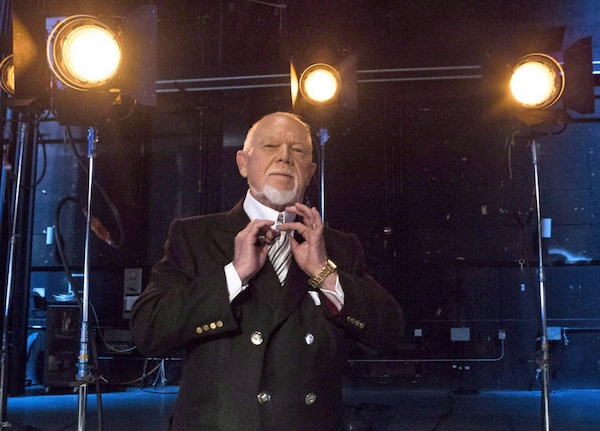
Why did thousands of us pfffft away the gay parodies and lisps when Don, seen here on March 10, 2014, spoke about players playing lightly, elegantly or wearing their hair a certain style?Chris Young/The Canadian Press
Dave Bidini is a member of Rheostatics and author of The Best Game You Can Name.
I watched Coach’s Corner. I watched it religiously. I’d put up my hands and get the room to stop.
“Grapes!”
Those were good times: Saturdays pressed against the TV watching Don’s reels of hitting, fighting, warring, scoring. This wasn’t 1988. This was 2008. After a time, I took to defending his innate, and once razor-sharp, hockey mind in spite of increasingly uncomfortable screeds that offended friends and communities.
I openly lobbied for more broadcasters like him in the pressed-trouser world of telegenic sports punditry, rallying for someone to be heard who sounded like your uncle, your neighbour, the guy who sits at the rink. But we’ve learned a lot about our uncles, and a lot about ourselves. Hopefully, we’ve learned something about the game, too.
The hockey fan – the Don Cherry fan; fans like me – have to ask: Why did it take this long for us to see that which we’d convinced ourselves we’d missed? Why did some of us – thousands of us – pfffft away the gay parodies and lisps when Don spoke about players playing lightly, elegantly, or wearing their hair a certain style? Why did we grin through it when he talked about women “yapping” all the time, justifying this kind of sexism by explaining away his support of women’s hockey (which, let’s hope, isn’t an intermission casualty along with Cherry’s firing)?
And why, after decades of mass-marketed video tapes of sporting blood, violence and the occasionally terrible techno soundtrack, did we wave it away as simply part of the game’s natural terrain, whom those seeking something better were forced to share? Don Cherry was this domain’s sultan who toggled between dinosauric roars of loyalty above all even when it meant risking brain injury – another maxim that, for years, many of us chalked up as being part of the game.
But if his employer, Rogers Sportsnet, deemed the act too offensive for broadcast, what does it say about fans that it only took until now to protest?
Because we live every day with the kinds of opinions expressed by Cherry before his demise – opinions about the rights of immigrants and their tax on society – some have suggested that we’re immune to mean frothing rants. But that doesn’t explain why it was able to exist for decades. No matter how twisted the world has become through the centre-presence of Donald Trump, mainstream white supremacists and the alt-right, it all comes back to the game.
Growing up, a lot of the best kids on my house-league teams were racialized teenagers. They scored, won Player-of-the-Week, and then disappeared. There was no path for them to continue beyond this level because there were no role models and no support, and that’s still largely true: in the media, in the dressing rooms, and in the marketing realm.
When has a hockey equipment manufacturer ever promoted to the underserved or marginalized? When’s the last time a major daily hired a racialized person to cover the home team? Can anyone remember any former players standing up for those in the small margins of the world instead of those who possess the promise of stardom?
There are always good people doing great work – Reggie Leach and Joey Juneau and Bryan Trottier, for instance, have worked tirelessly to promote hockey in Indigenous communities. And there are others – but for a long time, hockey has suffered from extreme whiteface.
Don Cherry may have visited your family member in the hospital and supported your drive to build a local rink – his energies for this kind of work were legion, and admirable. But Don drove a bus that kept the troubling status quo on the road, and we rode shotgun. In the end, it didn’t get us very far.
Keep your Opinions sharp and informed. Get the Opinion newsletter. Sign up today.